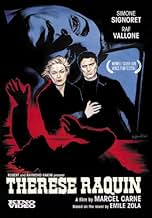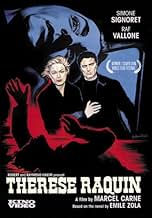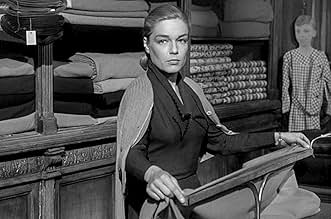The Adultress
Original title: Thérèse Raquin
- 1h 42m
IMDb RATING
7.4/10
2.1K
YOUR RATING
A truck driver kills the husband of the woman he loves, and becomes the object of blackmail.A truck driver kills the husband of the woman he loves, and becomes the object of blackmail.A truck driver kills the husband of the woman he loves, and becomes the object of blackmail.
- Director
- Writers
- Stars
- Awards
- 2 wins & 2 nominations total
Martial Rèbe
- Grivet
- (as Martial Rebe)
Francette Vernillat
- Françoise, la bossue
- (as Françoise Vernillat)
Madeleine Barbulée
- Madame Noblet, une cliente
- (as Madeleine Barbulé)
- Director
- Writers
- All cast & crew
- Production, box office & more at IMDbPro
7.42K
1
2
3
4
5
6
7
8
9
10
Featured reviews
Contrived, but So Was the Book
Emile Zola wrote page turners. He focused on the injustices of the great unwashed of France, from miners to prostitutes. His books were incredibly naturalistic and moralistic. His characters seldom came through unscathed but made a statement about the cultural milieu of the time. This is a story about passion. Therese Raquin is the wife of a tiresome mama's boy hypochondriac. She is beautiful and is married to this childish wimp. Along comes the handsome truck driver after she has spent six empty years with this guy. They have tryst and even let the husband know that he is going to lose his wife. Everything changes when, on a train trip to Paris, fate takes over. Granted, there are lots of plot contrivances, but that's the literary style of the period. Also, in the naturalist tradition, the characters often lose control of their destinies. There is a broader moral sense that trumps the likable ending that people are used to in movies made at this time. The writer and the director can't turn their backs on issues like these and so life goes on and the impulsive and evil are punished alike.
Don't throw this one off the train.
I'll have to disagree with some of the more negative comments about this film. Marcel Carne has succeeded beautifully in capturing the mood and major themes of Zola's novel in THERESE RAQUIN. It's nice to see a film from the period dealing with common working class people caught up in the turmoil of love and everyday life. The main romantic leads initially seem a little mismatched but by film's end the ice has more than melted between them. How many times have we seen the female lead fall too quickly for her suitor. Here it takes its sweet time and plays the better for it. Signoret's titular character seems almost a bit too stoic but considering her numbingly bland and lenghty marital situation, it may well be authentic. As many women are in reality, Therese is fiercely loyal to her husband, whether he deserves it or not. The ruggedly handsome Raf Vallone is ideally cast as the trucker who steals her attention and makes a good contrast to her dishrag of a husband. A blackmailing sailor who appears in the middle of the film before making a menacing reappearance near the end is very effectively played by Rolland leSaffre. He is as creepy as Robert Mitchum in CAPE FEAR. Do seek this one out and enjoy the ride!
The last great Carné.
People generally think that Carné's heyday comes to an end with "les portes de la nuit" (1946)And it's sure that- whatever the new wave's view on the matter-these thirties and forties movies are among the very best French cinema gave to the world("le jour se lève" "quai des brumes""les enfants du paradis" and "hôtel du nord" ,to name but four are the crème de la crème ,easily equalling the best of Renoir)One always tries to minimize Carné's importance,mentioning the actors (Gabin,Arletty,Simon,et al)and Jacques Prévert's screen plays.One often forgets that Carné did direct these masterworks and he always chose the right actors,decorators(Alexandre Trauner who was to work in Hollywood later),musicians,with mind-boggling results.
"Therese Raquin" (1953)came before the new wave but Carné 's credibility was sinking fast and he was given the coup de grace by his young "nouvelle vague" colleagues -before being restored to favor after 1980,actually after he stopped directing ."Therese Raquin is a fine mixing of pre and post -war elements
Pre-war:the lovers' impossible dream,fate -here represented by a young sailor-,scumbags who cannot stand true love-the scene on the train between Raf Vallone and Jacques Duby recalls the famous one between Jean Gabin and Jules Berry in "le jour se lève" (1939) particularly when Vallone screams"are you gonna shut your mouth?"(the lines are almost the same).
Post-war:the influence of the film noir-which was influenced by Marcel Carné's work mainly "le jour se lève"-who cares if it's a Zola adaptation?:the scenarists have transposed the action to the fifties,to the era of the making of the movie,and James Cain could have written it as the story reminds the spectator "the postman always rings twice:more than Tay Garnett's excellent version(1946),"Therese Raquin" is actually closer to Luchino Visconti's (Ossessione,1942),because of the Italian Raf Vallone's presence.
But in spite of the transposition,Zola's spirit remains intact:the stifling petit bourgeois milieu in which Thérèse (Simone Signoret)lives is meticulously depicted:the notions store ,the walk on the Rhone banks,the ludicrous board game,the dreadful mother-in-law(Sylvie is absolutely extraordinary;after she suffered an attack after her son's death,she's completely paralyzed ; only her eyes (her frightening eyes) are alive,accusing her daughter-in-law:Cain's eye in the Bible.In her over possessive part of a mother who has turned her only child into a poor guy,a sissy,Sylvie surpasses the excellent Signoret and Vallone.
No,Carné's career was not over in 1946,but after "Thérèse Raquin",the slump began:""les tricheurs" (1958)tried to catch up with the nouvelle vague with mixed artistical results,but has remained watchable."Trois chambres à Manhattan" (1965)was moderately interesting,thanks to its stars ,Maurice Ronet and Annie Girardot.After,it's downhill:"les jeunes loups" (1967)is a would be "a la mode" bomb,"les assassins de l'ordre"(1971) tried André Cayatte's style ,not exactly the right move and "la merveilleuse visite"(1973) failed dismally(as in "les visiteurs du soir",(1942),Satan sent two people,it's God's turn who send an angel!)
"Thérèse Raquin" should not be missed.You won't be disappointed .
"Therese Raquin" (1953)came before the new wave but Carné 's credibility was sinking fast and he was given the coup de grace by his young "nouvelle vague" colleagues -before being restored to favor after 1980,actually after he stopped directing ."Therese Raquin is a fine mixing of pre and post -war elements
Pre-war:the lovers' impossible dream,fate -here represented by a young sailor-,scumbags who cannot stand true love-the scene on the train between Raf Vallone and Jacques Duby recalls the famous one between Jean Gabin and Jules Berry in "le jour se lève" (1939) particularly when Vallone screams"are you gonna shut your mouth?"(the lines are almost the same).
Post-war:the influence of the film noir-which was influenced by Marcel Carné's work mainly "le jour se lève"-who cares if it's a Zola adaptation?:the scenarists have transposed the action to the fifties,to the era of the making of the movie,and James Cain could have written it as the story reminds the spectator "the postman always rings twice:more than Tay Garnett's excellent version(1946),"Therese Raquin" is actually closer to Luchino Visconti's (Ossessione,1942),because of the Italian Raf Vallone's presence.
But in spite of the transposition,Zola's spirit remains intact:the stifling petit bourgeois milieu in which Thérèse (Simone Signoret)lives is meticulously depicted:the notions store ,the walk on the Rhone banks,the ludicrous board game,the dreadful mother-in-law(Sylvie is absolutely extraordinary;after she suffered an attack after her son's death,she's completely paralyzed ; only her eyes (her frightening eyes) are alive,accusing her daughter-in-law:Cain's eye in the Bible.In her over possessive part of a mother who has turned her only child into a poor guy,a sissy,Sylvie surpasses the excellent Signoret and Vallone.
No,Carné's career was not over in 1946,but after "Thérèse Raquin",the slump began:""les tricheurs" (1958)tried to catch up with the nouvelle vague with mixed artistical results,but has remained watchable."Trois chambres à Manhattan" (1965)was moderately interesting,thanks to its stars ,Maurice Ronet and Annie Girardot.After,it's downhill:"les jeunes loups" (1967)is a would be "a la mode" bomb,"les assassins de l'ordre"(1971) tried André Cayatte's style ,not exactly the right move and "la merveilleuse visite"(1973) failed dismally(as in "les visiteurs du soir",(1942),Satan sent two people,it's God's turn who send an angel!)
"Thérèse Raquin" should not be missed.You won't be disappointed .
between naturalistic and noir thriller
'Thérèse Raquin' (1953) (English title - 'The Adultress') is Marcel Carné's third post-Prévert film. Connoisseur film fans consider it his latest remarkable film. It was produced by the famous Hakim brothers. Even though Jacques Prévert no longer wrote his screenplays and dialogues, Marcel Carné did not give up good literature for this film, and took as inspiration the novel 'Thérèse Raquin', Émile Zola's first great success, a story about passion, crime and punishment in France in the second half of the 19th century. From Zola's (suspenseful in my opinion) story of guilty love and remorse, this adaptation turns into a thriller with elements of film noir. Still suspenseful, of course, but in a completely different genre. It's not a bad movie, but it's a different movie, different from Zola and different from other Marcel Carné movies.
We learn about Therese's fate from dialogues, quite late in the film. The story begins when she is already unhappily married to her cousin Camille, a hypochondriac feeble man caressed by her mother (played by an exceptionally well-composed actress named Sylvie), who terrorizes his young wife. Frustrated from all points of view, Therese seeks refuge in a love affair with a trucker dressed in a leather jacket played by Raf Vallone. The passion of the two inevitably leads to murder, and the murder leads to complications when they are blackmailed by an unexpected witness. It can be said that the film is built of two distinct parts separated by the crime itself committed on the train (here we are dealing again with a change of place, in the novel the deed takes place on water): in the first we witness the suffocating atmosphere in the house the bourgeois family, which builds the premises of the violent act and in the second we follow the consequences of the act filmed in thriller style.
The production is uneven, but it has some beautiful cinematic moments. Simone Signoret is gorgeous both physically and as an actress. Most of us know her from her mature roles and after that - here she is young and fascinating, with eyes whose deep blue we 'see' even though it is a black and white film. The scene of the confrontation with the tyrannical mother-in-law, played only by eyesights (her mother-in-law was paralyzed) is intense and memorable. Raf Vallone, however, is not, in my opinion, up to his partner. The psychological shortcuts of the plot are not sufficiently offset by the elements of suspense in the second part of the film. Paradoxically, Marcel Carné seems more at ease when filming outside, on the streets of post-war Lyon or on the banks of the Rhône. The director, who was to be pushed aside by the younger newcomers of Nouvelle Vague and included in the category of 'cinema du papa', shows that he mastered a few years before them mobility of the camera, framing of the characters on the streets or in nature and direct sound recording. 'Thérèse Raquin' is an interesting film that deserves to be watched or re-watched as a cinematic document, for Simone Signoret, and as a more than acceptable thriller noir. Less, perhaps, for Zola's novel that inspired it.
We learn about Therese's fate from dialogues, quite late in the film. The story begins when she is already unhappily married to her cousin Camille, a hypochondriac feeble man caressed by her mother (played by an exceptionally well-composed actress named Sylvie), who terrorizes his young wife. Frustrated from all points of view, Therese seeks refuge in a love affair with a trucker dressed in a leather jacket played by Raf Vallone. The passion of the two inevitably leads to murder, and the murder leads to complications when they are blackmailed by an unexpected witness. It can be said that the film is built of two distinct parts separated by the crime itself committed on the train (here we are dealing again with a change of place, in the novel the deed takes place on water): in the first we witness the suffocating atmosphere in the house the bourgeois family, which builds the premises of the violent act and in the second we follow the consequences of the act filmed in thriller style.
The production is uneven, but it has some beautiful cinematic moments. Simone Signoret is gorgeous both physically and as an actress. Most of us know her from her mature roles and after that - here she is young and fascinating, with eyes whose deep blue we 'see' even though it is a black and white film. The scene of the confrontation with the tyrannical mother-in-law, played only by eyesights (her mother-in-law was paralyzed) is intense and memorable. Raf Vallone, however, is not, in my opinion, up to his partner. The psychological shortcuts of the plot are not sufficiently offset by the elements of suspense in the second part of the film. Paradoxically, Marcel Carné seems more at ease when filming outside, on the streets of post-war Lyon or on the banks of the Rhône. The director, who was to be pushed aside by the younger newcomers of Nouvelle Vague and included in the category of 'cinema du papa', shows that he mastered a few years before them mobility of the camera, framing of the characters on the streets or in nature and direct sound recording. 'Thérèse Raquin' is an interesting film that deserves to be watched or re-watched as a cinematic document, for Simone Signoret, and as a more than acceptable thriller noir. Less, perhaps, for Zola's novel that inspired it.
Vivid and brooding, a Euro-noir, with a cold, stunning Signoret...slow but alive
Therese Raquin (1953)
You may be familiar with the lead actress, Simone Signoret, from Les Diaboliques, made a year after this film, and she plays a similar conflicted or complex, strong type of woman in a sordid world. She plays the title character, based on a Zola story, who is swept into a romance she doesn't completely expect and then a murder that she doesn't completely abhor.
And she is rather brilliant, a slightly different type than American actresses of the time, but commanding in her stoic intelligence. The two men are both first rate, one a foreign (Italian) charmer and the other a sharper fellow who is only slightly over his head. In fact, everyone is just slightly extended into decisions they don't quite know how to make. The fact that things go wrong is just part of great drama, and part of life, too.
The filming (photography and editing) is totally gorgeous here, The plot progresses slowly enough it might seem to drag, but I think it works in the long run, setting a deliberate and inevitable pace to events. What is maybe weakest is the ending, where things get a little spectacular, perhaps in a fascinating way, but certainly no longer believable.
Director Marcel Carne is no household name in this country, but the strength of this film alone makes me want to find others and get a feel for his style. Recommended for those who like drama, melodrama, and a sort of Euro-noir style, and who don't mind reading subtitles.
You may be familiar with the lead actress, Simone Signoret, from Les Diaboliques, made a year after this film, and she plays a similar conflicted or complex, strong type of woman in a sordid world. She plays the title character, based on a Zola story, who is swept into a romance she doesn't completely expect and then a murder that she doesn't completely abhor.
And she is rather brilliant, a slightly different type than American actresses of the time, but commanding in her stoic intelligence. The two men are both first rate, one a foreign (Italian) charmer and the other a sharper fellow who is only slightly over his head. In fact, everyone is just slightly extended into decisions they don't quite know how to make. The fact that things go wrong is just part of great drama, and part of life, too.
The filming (photography and editing) is totally gorgeous here, The plot progresses slowly enough it might seem to drag, but I think it works in the long run, setting a deliberate and inevitable pace to events. What is maybe weakest is the ending, where things get a little spectacular, perhaps in a fascinating way, but certainly no longer believable.
Director Marcel Carne is no household name in this country, but the strength of this film alone makes me want to find others and get a feel for his style. Recommended for those who like drama, melodrama, and a sort of Euro-noir style, and who don't mind reading subtitles.
Did you know
- TriviaRaf Vallone refused to be dubbed in the French version and had his contract amended accordingly. The scenario was also slightly changed to "Italianize" the character of Laurent.
- ConnectionsFeatured in Mémoires pour Simone (1986)
- How long is The Adultress?Powered by Alexa
Details
- Runtime
- 1h 42m(102 min)
- Color
- Aspect ratio
- 1.37 : 1
Contribute to this page
Suggest an edit or add missing content































